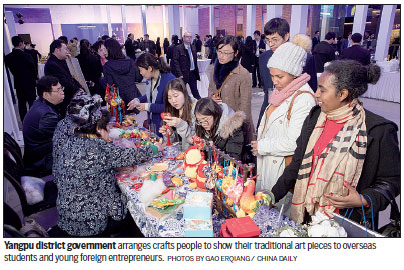Chasing the dream in a foreign land
Buoyed by policies that encourage entrepreneurship, a growing number of people who graduate from Chinese universities are choosing to pursue their business ambitions in Shanghai instead of their own countries
In February, two months after registering Big Bread Gaming, a startup in Shanghai that helps Chinese mobile games break into foreign markets, co-founder Joyce Tang and her team comprising six other foreigners launched their first product in France and Germany.
As it turned out, the reception to their role-playing game Trojan Troops was much better than expected.
"A game is considered successful if around 40 percent of the users return to play it the next day. This game had a 37 percent return rate in both markets," said Tang, a Singaporean who studied at Fudan University from 2009 to 2011 and majored in Chinese economy.

Since policies were unveiled in June 2015 to allow and encourage entrepreneurship in the city, many foreigners like Tang have been setting up startups following their graduation from a Chinese university.
International students who graduate from universities on the Chinese mainland can apply for a two-year residence permit by presenting their graduation certificates and business plans or proof that their startup is based in the city.
"Shanghai is becoming a more attractive place for international students. Astonishing changes have been taking place these past few years as the city strives to enhance the living, working and learning conditions of its residents in a bid to become a vibrant hub for many industries," said Zhang Xiaosong, director of the Foreign Affairs Office of Shanghai Municipal People's Government.
Yang Jianrong, director of the Council for the Promotion of International Trade Shanghai, believes that an increasing number of foreign talent, including young graduates, will opt to start their careers or carry out their business plans in the city thanks to the local government's efforts to grant foreigners easier access to permanent resident permits so as to boost entrepreneurship and innovation.
While there is no official information regarding the number of businesses in Shanghai started by foreigners, there are 564 such companies in Yangpu district, the municipality's demonstration zone of mass entrepreneurship and innovation.
According to the National Bureau of Statistics, 215,000 foreigners from 167 countries and regions are currently working in Shanghai, the largest number among Chinese cities.
After graduation, Tang joined a local company specializing in mobile games development, entering the sector at a time when the smart phone and mobile games industry were experiencing robust growth. Not long after, she joined a South Korea-based company as a regional head and was responsible for introducing their mobile games to the Chinese market.
After witnessing the rapid development of mobile games in China and how several promising local development outfits were eager to push their well-executed games into foreign markets, Tang decided to lend them a helping hand. She soon gathered six other foreigners, including Spaniards, Germans, Russians and Italians, who were working in the industry and set up Big Bread Gaming.
The first step in the globalization process is to help Chinese game developers determine the product that will best cater to the tastes of the foreign markets. She said that Russians generally prefer action-packed war-themed games while the British are more inclined to play strategy ones.
"For example, games with cutesy characters that have large heads are usually unpopular with Westerners," said Tang.
In addition, not every element in a Chinese game is transplanted onto their foreign renditions because of cultural differences.
"For instance, many local games have a ranking table that shows how much money players have spent in the game. This type of system spurs some Chinese players to spend more in order to move up the rankings. Westerners, on the other hand, don't like the idea of showing off," she said.
Tang believes that Big Bread Gaming is likely the only startup in Shanghai that helps promote Chinese mobile games in non-English speaking countries and she hopes to have 20 team members by the end of this year.

 Print
Print Mail
Mail




